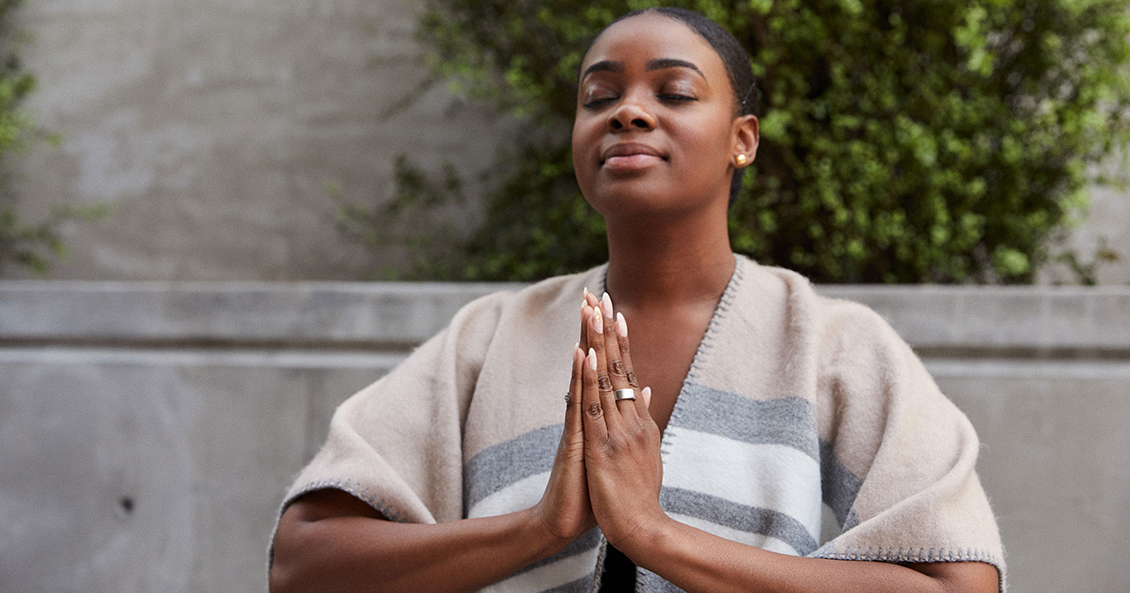With additional reporting by Janet Ungless
Can’t sleep? Consider meditation. Through decades of scientific study, researchers have found this ancient practice can improve sleep and fight insomnia. Through meditation, you can train your mind to more easily enter a relaxed state.
Curious how meditation helps you sleep? When your mind is relaxed, your body benefits. Studies focused on brainwaves, hormone production, cardiovascular activity, and oxygen consumption show an overwhelmingly positive relationship between meditation and sleep quality.
RELATED: Managing Stress: The Mind-Body Connection
What Is Meditation?
While there are many different types, meditation is, in short, the practice of being fully present in the moment.
One common misconception is that in order to meditate properly, you must empty your mind completely and not have any errant thoughts. “Those who are new to meditation often think, ‘Wait, my mind keeps wandering off so I must be doing it wrong,’” says Chris Winter, MD, neurologist, sleep specialist, author of The Rested Child, and host of the podcast Sleep Unplugged. “Actually, that means you’re doing it right — because you’re aware of the moments when you’re drifting off in thought.”
At its core, meditation is about learning to observe your thoughts with a bit of distance, a more detached perspective and self-awareness, and let them pass. When you notice that your mind has wandered off, simply acknowledge it and bring your attention back to the breath, Winter notes. “Meditation is a skill, and like any skill, the more you practice, the easier it gets — and the better you get at it.”
If you’re an Oura member, you can find meditations designed specifically to help you fall asleep in the Explore tab, and can get instant biofeedback on how it affected your body, in the Oura App. (More on that below.) Other smartphone apps, such as Headspace or Calm, have audio meditations you can try, and you can also find options for free on YouTube.
RELATED: 5 Simple Breathing Techniques for a Good Night’s Sleep
Mind-Body Benefits of Meditation
Like a good nap, meditation recharges and refreshes your mind and body.
Physiologically, there are many similarities between sleep and meditation. Both boost vital hormones in your body (e.g. growth hormone and DHEA) and reduce the stress hormone, cortisol. Even your brainwave activity is stimulated in a similar way, increasing the waves associated with sleep and relaxation (alpha, theta, and delta), while reducing the waves associated with cognitive workload (beta).
Mentally, frequent meditation can help you enter a relaxed state more easily. It’s like building a muscle or perfecting a skill–the more you practice engaging your rest-and-digest system while you’re awake, the easier it becomes to generate that same response at night to promote sleep.
Moreover, meditation reduces stress and dials down activity in your fight-or-flight system. It also enhances your body’s melatonin cycle, the primary sleep-promoting hormone, by slowing down melatonin breakdown in the liver and augmenting its production in a part of the brain called the pineal gland.
More proof: In a year-long study of older adults with moderate sleep disturbances, researchers at UCLA found mindfulness and meditation practices to be effective in remedying short-term sleep issues. Also, mindfulness and meditation were shown to reduce the effects of sleep-related daytime impairment, like being cranky, fatigued, and irritable.
Meditating with Oura
Oura members can head to the Explore content in their Oura App to choose from guided or unguided meditation sessions that range in length from 5 minutes to 30 minutes. Use these to wind down and doze off to sleep, or just take a moment to breathe and relax during the day.
You’ll also receive post-session biofeedback from meditation sessions lasting longer than five minutes. This means you can see how your body responds to meditation in real time, including heart rate, HRV, skin temperature, and sleep latency. If you see that a particular session helps you fall asleep faster, you can add it to your bedtime routine. You will also gain insights into how listening to guided audio sessions impacts your data over time.
If you try meditation to help you sleep better, give your body at least a week to adapt to your new routine.
Look for changes to these metrics in your Oura App to evaluate how meditation may be impacting your sleep patterns:
- Increased number of sleep cycles
- Higher REM sleep totals
- Lower resting heart rate
- Reduced sleep latency (how long it takes you to fall asleep)
LEARN MORE: All About Your Resting Heart Rate











